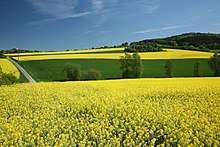kevät
Finnish
Etymology
From Lua error in Module:parameters at line 360: Parameter 2 should be a valid language or etymology language code; the value "fiu-fin-pro" is not valid. See WT:LOL and WT:LOL/E., from Proto-Uralic *keŋä.
Pronunciation
Noun
| Previous: | talvi |
|---|---|
| Next: | kesä |
kevät
- spring, springtime (season of the year)
Declension
Lua error in Module:fi-nominals at line 184: Genitive grade (parameter 3) may not be omitted.
Compounds
- kevätaamu
- kevätaika
- kevätasu
- kevätaurinko
- kevätesikko
- keväthanki
- kevätilma
- kevätilta
- kevätistuntokausi
- kevätistutus
- kevätjuhla
- kevätjää
- kevätkausi
- kevätkello
- kevätkesä
- kevätkuukausi
- kevätkylmä
- kevätkylvö
- kevätkynsimö
- kevätkyntö
- kevätkääryle
- kevätlukukausi
- kevätmuoti
- kevätpuku
- kevätpuu
- kevätpäivä
- kevätpäiväntasaus
- kevätruis
- kevätrulla
- kevätsää
- kevättalvi
- kevättulva
- kevätvehnä
- kevätvilja
- kevätväsymys
See also
- (seasons) vuodenaika; kevät, kesä, syksy, talvi (Category: fi:Seasons)
Ingrian
| Previous: | talvi |
|---|---|
| Next: | kesä |

Etymology
From Lua error in Module:parameters at line 360: Parameter 2 should be a valid language or etymology language code; the value "fiu-fin-pro" is not valid. See WT:LOL and WT:LOL/E., from Proto-Uralic *keŋä. Cognates include Finnish kevät and Estonian kevad.
Pronunciation
- Lua error in Module:parameters at line 360: Parameter 1 should be a valid language or etymology language code; the value "Ala-Laukaa" is not valid. See WT:LOL and WT:LOL/E. IPA(key): /ˈkevæt/
- Hyphenation: ke‧vät
Noun
kevät
- spring
- 1936, N. A. Iljin and V. I. Junus, Bukvari iƶoroin șkouluja vart, Leningrad: Riikin Ucebno-pedagogiceskoi Izdateljstva, page 62:
- Hiljakaistaa ootteloo, kons se kevät tulloo.
- Slowly it would wait, when spring comes.
Declension
| Declension of kevät (type 7/kevät, no gradation, gemination) | ||
|---|---|---|
| singular | plural | |
| nominative | kevät | kevväet |
| genitive | kevväen | kevväein |
| partitive | kevättä | kevväeitä |
| illative | kevväesse | kevväeisse |
| inessive | kevväees | kevväeis |
| elative | kevväest | kevväeist |
| allative | kevväelle | kevväeille |
| adessive | kevväeel | kevväeil |
| ablative | kevväelt | kevväeilt |
| translative | kevväeks | kevväeiks |
| essive | kevväennä, kevväeen | kevväeinnä, kevväein |
| exessive1) | kevväent | kevväeint |
| 1) obsolete *) the accusative corresponds with either the genitive (sg) or nominative (pl) **) the comitative is formed by adding the suffix -ka? or -kä? to the genitive. | ||
References
- Ruben E. Nirvi (1971) Inkeroismurteiden Sanakirja, Helsinki: Suomalais-Ugrilainen Seura, page 161
- Template:R:izh:Chernyavskij:2005
- Olga I. Konkova, Nikita A. Dyachkov (2014) Inkeroin Keel: Пособие по Ижорскому Языку[1], →ISBN, page 68
Categories:
- Finnish terms inherited from Proto-Uralic
- Finnish terms derived from Proto-Uralic
- Finnish 2-syllable words
- Finnish terms with IPA pronunciation
- Finnish terms with audio links
- Rhymes:Finnish/eʋæt
- Rhymes:Finnish/eʋæt/2 syllables
- Finnish lemmas
- Finnish nouns
- Finnish entries with topic categories using raw markup
- fi:Seasons
- Ingrian terms inherited from Proto-Uralic
- Ingrian terms derived from Proto-Uralic
- Ingrian terms with IPA pronunciation
- Ingrian lemmas
- Ingrian nouns
- Ingrian terms with quotations
- izh:Seasons
